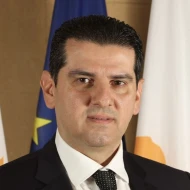In a brief statement, DEFA said it had received an email from Itera earlier in the day, in which the Russians indicated they were not willing to further revise their offer as they already consider it cost-effective.“Based on the above developments, DEFA’s board of directors proceeded with its decisions and has notified Itera that negotiations with it have been completed,” the statement said. The DEFA board will convene early next week to discuss the “further handling of the arising issues,” it added.
It’s understood that the tender itself has not been scrapped. DEFA can now presumably initiate talks with Vitol, whose bid was ranked second-best in terms of price and proposed delivery date. Both Itera’s and Vitol’s bids involved procuring liquefied natural gas (LNG) and re-gasifying it aboard Floating Storage and Regasification Units. The gas would be used to generate electricity at Vasilikos, the island’s main power plant.
Vladimir Makeev, vice president of the Itera Group, had flown here for last-ditch talks with DEFA yesterday afternoon, but the scheduled meeting was called off after Itera’s email.
Itera evidently saw no point in taking the meeting, sources said. But it’s understood that Makeev got some face-time with the President on Wednesday evening, briefing Nicos Anastasiades on the situation.
Meanwhile, the Mail is told that, at the behest of the administration, a government department may be taking a closer look into the natural gas saga. Sources said an agency – perhaps the auditor-general – could be tasked with scrutinizing the whole tender process, in particular the latter stages involving advanced talks between DEFA and Itera.
DEFA’s tender stipulated the provision of natural gas from September 2015 to late 2018, with an option for a 15-month extension.After weeks of talks, DEFA – in conjunction with the electricity utility – decided that an updated price the Russians quoted for natural gas was still not good enough. The Russians reportedly first offered around $16 per million BTU later agreeing to drop to $14.75 (€11). DEFA and the electricity utility determined that this will still too expensive, and wanted the Russians to go even lower. Itera’s latest offer of $14.75 is slightly higher than the current spot market rate for natural gas ($12.5 to $13).
It’s understood that the price quoted by Itera covers fuel costs (LNG), delivery and capital investments. Under the terms ofthe tender, DEFA is not obliged to pick a supplier if it deems that the price of electricity does not drop significantly through the use of natural gas. The dispute revolves precisely around defining what a significant drop in electricity price is, with Itera and DEFA/EAC apparently disagreeing on core assumptions.
The Ant1 news network recently revealed a confidential report, compiled by the EAC and forwarded to DEFA, showing that, under Itera’s offer, between 2015 and 2021 the electricity utility would save some €800m by running its plants almost exclusively on natural gas instead of mazut and diesel. According to the report, the cost of mazut and diesel for the six years would come to some €3.3bn. By contrast, with natural gas under Itera’s offer, the fuel cost would amount to a little less than €2.5bn.
The EAC has acknowledged the report’s authenticity, but argues that the report’s findings were founded on initial assumptions made by Itera that are no longer valid. The electricity utility now claims that, due to the financial crisis, it anticipates a sharp drop in electricity demand in the coming years – hence less fuel needs to be purchased. The lower the volume or quantity of fuel required, the higher the price per unit, rendering Itera’s price unattractive.
According to the EAC, the utility will need 845,000 tonnes of liquid fuel for this year, compared to 1.1 million tonnes it purchased in 2012 – a decrease of around 20 per cent. In 2012 the EAC spent €645m on fuel. Only this week the EAC said it was inviting tenders for the purchase of liquid fuels for the period December 2013 to January 2015, where it estimates it will need around 800,000 thousand tonnes of fuel – not much of a plunge compared to 2013.
Some commentators have been suggesting that liquid fuel importers are leaning on the EAC not to switch to natural gas. Cyprus is looking to secure intermediate supplies of the cleaner natural gas to fire its power stations until its own offshore hydrocarbon reserves come on tap. Currently, the island is reliant on costly heavy fuel oil (mazut) and the even more expensive diesel. Eurostat figures show that household electricity prices in Cyprus are the highest in the EU-27, both in terms of kilowatt-hours and in terms of living costs.
Source: Cyprus Mail













